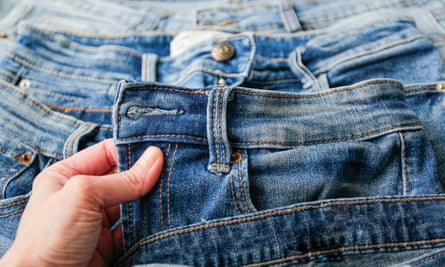Whether it’s heirloom vintage or fast fashion, all clothes deserve care. Not only is it a sign of respect for the human labour and resources that went into making each garment, but washing carefully and sparingly can add years to their lifespan.
That said, not all clothes are created equal. There’s a reason we find ourselves flinging some things in the wash after every wear, only for them to end up misshapen or faded. Ever noticed the whiff of a polyester dress after a night out? Or marvelled at the sweater your dad claims not to have washed since 1995? Material matters, and it pays to choose fabrics that can go the distance.
From the ancient to the innovative, here are five fabrics that might help you skip laundry day.
Wool
We all have that one shrunken jumper that still haunts us – but when treated right, wool is one of the most low-maintenance materials there is. Wool has some antimicrobial properties: its fibres are coated in waxy lanolin (the same thing that helps make sheep waterproof), which wicks moisture away from the body and resists the growth of odour-causing bacteria, meaning it can be worn again and again without washing. And thanks to ultra-fine merino wool, which is increasingly being used to make T-shirts, it can even be a wardrobe year-rounder.
Just steam or air your woollens when they need a refresh – and make sure to jump on any spillages quickly, since wool can be more vulnerable to dried-in stains. And when you do decide it’s time to wash, use a delicate detergent, like Ecover’s Wool & Silk Laundry Detergent, and a delicate approach. Wash cool, and skip the tumble dryer – you’re not making that mistake again.

Denim
You might have balked at people telling you you’re “not supposed to wash jeans”, but the claim stands up. With its origins in durable workwear for manual labourers, denim is designed to cope with hard graft – but not hot water. Overwashing can lead to fading and shrinkage, as well as undoing the fabric’s trademark tendency to mould to your body over time.
It’s better to stick with spot washes for stains, and airing outside for a refresh. While true aficionados will go for years between washes, every 10 wears is a good rule of thumb for the squeamish. And when you do wash your jeans, turn them inside out to reduce friction damage and keep the temperature low, or risk having to break them in all over again.

Linen
It’s been around for at least 10,000 years, but linen still looks fresh every summer – as will you, because the flax fabric is naturally breathable. It also wicks moisture away from the body, dries quickly and boasts antimicrobial silica, which helps prevent the kind of pong you might associate with a hot-weather wardrobe.
Yes, there are the creases. But if “haute scruff” isn’t your vibe, then it’s better to steam or iron your linen than wash it too often, as a vigorous spin is more likely to cause wrinkles. Likewise, avoid bleach, which damages the fabric, and skip fabric softener, which can leave a residue that makes linen feel stiffer. The best way to soften it is wearing it on repeat. Your loyalty will be rewarded.
Hemp
For many years it’s been a tree-hugging punchline, but wearing hemp doesn’t have to be a crunchy experience. In fact, it makes beautifully comfortable fabric, which, like linen, gets softer with age. It’s also thermoregulating thanks to its hollow fibre structure, and is naturally antibacterial – all of which means you shouldn’t need to wash it too often. Plus, it’s a crop that requires no pesticides, so that’s one less reason to sweat.
This easy-going fabric isn’t prone to shrinkage or degradation and is generally happy in a washing machine. But it’s best to wash and dry at a cool temperature, and use a gentle detergent without bleach or other strong chemicals that will harsh your hemp’s mellow.
Lyocell
Mostly sold under the brand name Tencel, lyocell is a low-impact alternative to viscose, made from wood pulp. Among its many credentials, lyocell claims “efficient moisture management”, with tiny canals between its cellulose fibres helping to absorb sweat and keep you dry – which is why you’ll increasingly find it used in activewear. Nobody’s suggesting you go weeks without washing your gym kit, but for everyday clothes you might find it passing the sniff test more often than polyester or cotton.
Spot-clean stains (but avoid rubbing too hard, as this could damage the fabric), and when it’s time to wash, use a delicate cycle at 30C or cooler, and air-dry. You know the drill.
Want to give your clothes a new lease of life? Whatever materials they’re made from, find out how on Ecover’s Let’s Live Clean podcast series, featuring Lydia Bolton’s tips on how to repair and upcycle your clothes
